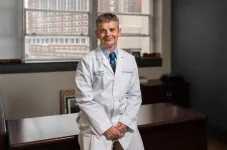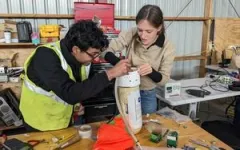(Press-News.org) LEXINGTON, Ky. (Nov. 14, 2023) — One University of Kentucky researcher has helped solve a 60-year-old mystery about one of the body’s most vital organs: The heart.
Kenneth S. Campbell, Ph.D., the director of translational research in the Division of Cardiovascular Medicine in the UK College of Medicine, helped map out an important part of the heart on a molecular level. The study titled “Cryo-EM structure of the human cardiac myosin filament” was published online in the prestigious journal Nature earlier this month.
The heart is made up of billions of cells. Each cell contains thousands of smaller structures, called sarcomeres. These are the building blocks of muscle. Within each block, are hundreds of myosin filaments. To put this microscopic level into perspective, if the heart is a continent, Campbell and fellow researchers are looking at single strands of hair.
“Each filament has roughly 2,000 molecules arranged in a really complicated structure that scientists have been trying to understand for decades,” said Campbell. “We knew quite a lot about the individual molecules and people thought the myosins could be arranged in groups of six that were called crowns, but not much beyond that.”
Campbell explained the most interesting discovery in the paper is that there are three different types of crowns. The interactions between them are shown in the second photo below.
“We think this means that heart muscle can be controlled more precisely than we had realized. We were also excited to see how myosin binding protein-C, another protein that is linked to genetic heart disease, sits within the structure. It gives us a new level of information about how the molecules are arranged in the heart,” said Campbell.
Working with researchers at the University of Massachusetts Chan Medical School, the group produced single-particle 3D reconstructions of the cardiac thick filaments. The pictures provide a new framework for interpreting structural, physiological and clinical observations.
“This study is important for discovering new drug therapies for heart disease which Kentucky desperately needs,” said Campbell. “It gives us a much better understanding of how the molecules in our hearts interact.”
Heart disease is the leading cause of death in Kentucky and puts the Commonwealth among the top 10 states with the highest death rate from the disease, according to the Centers for Disease Control and Prevention (CDC).
“We’re interested in therapies for different kinds of heart failure and myopathies, where the heart muscles don’t work very well,” said Campbell. “Our research is one of many projects underway at the university to help come up with better therapies for heart disease.”
The research team collected heart samples from the Gill Cardiovascular Biorepository, of which Campbell is the director. Samples are donated for research purposes from patients who receive cardiovascular care at UK.
“We started the Gill Cardiovascular Biorepository in 2008. With the help of a surgeon at UK HealthCare, we started collecting samples of myocardium from organ donors and from patients who were getting cardiac transplants,” said Campbell. “Now we’ve built a huge resource with roughly 15,000 samples from nearly 500 people.
“We also share these samples with research groups around the world. This study in Nature comes from one of those collaborations.”
Nature is a weekly international journal and is considered one of the most prestigious and widely respected scientific journals in the world. First published in 1869, the journal now covers a wide range of scientific disciplines and publishes original research, review articles, opinion pieces and news related to various fields of science.
“If you get a paper published in Nature, it means that scientists think that this work is important to everybody, not just people who specialize in that particular area,” said Campbell. “It’s a career highlight.”
Campbell, who holds a joint appointment in cardiovascular medicine and physiology, has taken an undergraduate degree in physics and transformed it into a career focused on helping people.
“I used to care a lot about math and molecules,” said Campbell. “But after hearing a friend who’s a cardiothoracic surgeon talk about patients, I realized I could take my scientific skills and do research that has a chance of helping people. It’s given my science purpose.
“And to the patients at UK HealthCare who’ve donated samples to us, we hope they know how much they’ve helped drive world-class research to, hopefully, help others who get sick.”
Research reported in this publication was supported by the National Heart, Lung, and Blood Institute of the National Institutes of Health under Award Numbers R01HL149164 and R01HL148785. The content is solely the responsibility of the authors and does not necessarily represent the official views of the National Institutes of Health.
UK HealthCare is the hospitals and clinics of the University of Kentucky. But it is so much more. It is more than 10,000 dedicated health care professionals committed to providing advanced subspecialty care for the most critically injured and ill patients from the Commonwealth and beyond. It also is the home of the state’s only National Cancer Institute (NCI)-designated cancer center, a Level IV Neonatal Intensive Care Unit that cares for the tiniest and sickest newborns, the region’s only Level 1 trauma center and Kentucky’s top hospital ranked by U.S. News & World Report.
As an academic research institution, we are continuously pursuing the next generation of cures, treatments, protocols and policies. Our discoveries have the potential to change what’s medically possible within our lifetimes. Our educators and thought leaders are transforming the health care landscape as our six health professions colleges teach the next generation of doctors, nurses, pharmacists and other health care professionals, spreading the highest standards of care. UK HealthCare is the power of advanced medicine committed to creating a healthier Kentucky, now and for generations to come.
END
University of Kentucky researcher helps solve 60-year mystery inside heart, publishes in Nature
2023-11-14
ELSE PRESS RELEASES FROM THIS DATE:
Melting ice falling snow: Sea ice declines enhance snowfall over West Antarctica
2023-11-14
UNIVERSITY PARK, Pa. — As the world continues to warm, Antarctica is losing ice at an increasing pace, but the loss of sea ice may lead to more snowfall over the ice sheets, partially offsetting contributions to sea level rise, according to Penn State scientists.
The researchers analyzed the impacts of decreased sea ice in the Amundsen Sea in West Antarctica and found the ice-free ocean surface leads to more moisture in the atmosphere and heavier snowfalls on the ice sheet, the team reported in the journal Geophysical Research Letters.
While the additional snowfall is not enough to offset the impacts of melting ice, including it in climate ...
Dangerous bee virus less deadly in at least one US forest, researchers find
2023-11-14
UNIVERSITY PARK, Pa. — This year’s cold and flu season is bringing good news for honey bees: Penn State researchers have found that the deadly deformed wing virus (DMV) may have evolved to be less deadly in at least one U.S. forest. The findings could have implications for preventing or treating the virus in managed colonies, researchers said.
The study, which was recently published in the Proceedings of the Royal Society B, compared rates and severity of DWV in wild honey bees from ...
Using machine learning, existing fiber optic cables to track Pittsburgh hazards
2023-11-14
UNIVERSITY PARK, Pa. — Existing fiber optic cables used for high-speed internet and telecommunications, in combination with machine learning, may be able to help scientists track ground hazards in Pittsburgh. The National Science Foundation awarded a $937,000 grant to a team of Penn State and Carnegie Mellon University (CMU) researchers to further develop the low-cost monitoring approach.
The effort, which is led by Tieyuan Zhu, associate professor of geosciences at Penn State, relies on prior research that shows hazards such as flooding, landslides, sinkholes and leaking pipes can be monitored at a fraction of the cost of existing methods.
The distributed acoustic sensing ...
Downloading NASA’s dark matter data from above the clouds
2023-11-14
Data from a NASA mission to map dark matter around galaxy clusters has been saved by a new recovery system designed by scientists at the University of Sydney. The system allowed the retrieval of gigabytes of information, even after communication failed and the balloon-based telescope was damaged in the landing process.
In April, the Super Pressure Balloon Imaging Telescope (SuperBIT) was launched from Wānaka Airport, New Zealand, suspended under a helium-filled balloon the size of a sports stadium on top of the Earth’s ...
Non-native species likely to continue spreading in North America, Australia and Europe
2023-11-14
Naturalized species, which are not native but have established themselves in new locations, have the potential to spread even further to suitable habitats in many parts of the world, reports a new study by Henry Häkkinen, Dave Hodgson and Regan Early at the University of Exeter, UK, publishing November 14th in the open access journal PLOS Biology.
Understanding and predicting where introduced species will spread is one of the key conservation and ecological challenges of the 21st century. However, we know little about what causes one species to spread rapidly, while another species remains in small, isolated populations for years. In ...
Twitter analysis shows users in states affected by hurricanes discuss climate change up to 200 percent more frequently in the weeks immediately post-hurricane
2023-11-14
Twitter users in areas affected by major hurricanes discussed climate change much more frequently right after the hurricane, according to a study published November 23, 2023 in the open-access journal PLOS Climate by Maddalena Torricelli from the City University of London, UK, and colleagues.
There’s evidence that people’s attitude towards climate change is influenced by extreme weather. To better understand how hurricanes might affect public discussion around climate change, Torricelli and colleagues analyzed 65 million Twitter posts (prior to the platform’s rebranding to “X”) related ...
EPA-funded research examines renewable energy choices in light of community values
2023-11-14
A plentiful source available for carbon-free electric power in New England states is hydroelectric dams across the border in Canada. But getting that power into the Northeast has hit political headwinds.
Ryan Calder, assistant professor of environmental health and policy in the Public Health Program within the Virginia-Maryland College of Veterinary Medicine, is the principal investigator in a $650,000 grant from the Environmental Protection Agency (EPA) for research on how divides might be bridged in order to accelerate decarbonization of New England’s ...
Teaming up to beat the heat
2023-11-14
This summer marked the Earth’s hottest on record.
The Roanoke Valley was no exception to the heat, with news reports naming 2023 as the region’s second-hottest summer. But the rising temperatures were particularly stifling for some neighborhoods in Roanoke — those impacted by harmful urban planning practices.
Theodore Lim, assistant professor of urban affairs and planning in the School of Public and International Affairs at Virginia Tech, has been working with the City of Roanoke to address the underlying issues that led to the Urban Island Heat Effect. The phenomenon happens in cities when ...
Study finds no effect of anti-inflammatory medication on incident frailty
2023-11-14
Frailty is a common condition in older populations that increases the risk of adverse health outcomes and mortality. Inflammation, associated with other aging-related conditions, has been proposed as one possible underlying mechanism for frailty. It was previously unclear if anti-inflammatory medications like canakinumab can also reduce risk of frailty.
Researchers led by a team at Brigham and Women’s Hospital, a founding member of the Mass General Brigham healthcare system, tested if canakinumab affected frailty incidence in adults with atherosclerosis.
The investigators performed post-hoc analysis on a dataset from the Canakinumab Anti-Inflammatory Thrombosis Outcomes Study ...
Hope takes root in Uganda
2023-11-14
In front of a mud brick house, a woman started a fire.
Using wood harvested from a grove of nearby acacia and river bushwillow trees, she arranged kindling and then layered over larger pieces culled from the fast-growing trees. When the fire was hot enough, she set a pot over the center to boil water for beans, a vital food source that will take hours to cook.
This daily ritual — enacted by many of the 1.5 million refugees displaced in Uganda — raises critical questions about how countries, communities, and humanitarian actors can efficiently and effectively provide safety and food for ...



